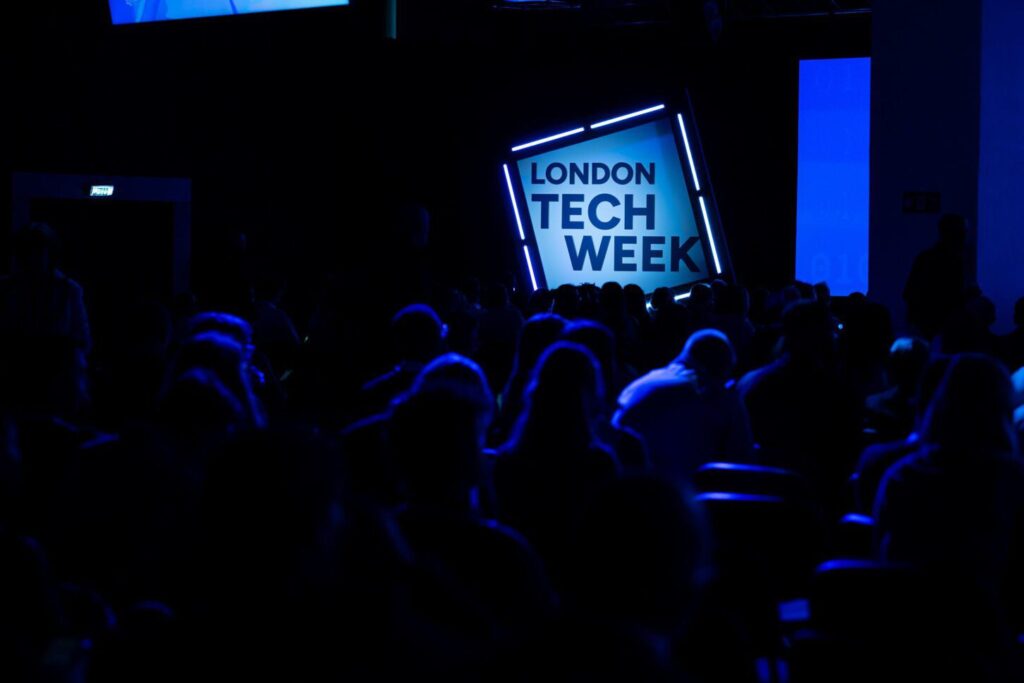The air at London Tech Week 2025 last week wasn’t just abuzz with ideas. It crackled with a palpable sense of urgency: Have we suddenly moved from merely experimenting with Artificial Intelligence to a period of undeniable, world-changing action? That was the clear, resounding message echoing through Olympia’s cavernous halls, a jamboree of bold ideas, expert talks, and fervent debates.
London Tech Week 2025: Has AI Finally Moved From Experiment to World-Changing Action?
The standout moment, a truly tempting proposition that captured widespread imagination, was the idea that everyone might soon have a digital twin.
This sophisticated AI counterpart would be capable of sorting out our lives, handling mundane tasks, and even – tantalizingly – earning us “free money.” But what else did this pivotal event reveal about the future of AI?
Action Stations: Leaders Galvanize the AI Push
The week kicked off with a seismic announcement: Sir Keir Starmer, the leader of the Labour Party, joined forces with Jensen Huang, the charismatic chief executive of tech giant Nvidia. Their partnership aims to bolster the UK’s AI infrastructure and skills.
Huang, in his trademark leather jacket, masterfully schmoozed the crowd by posing a thought-provoking question: was it scarier to be aboard the AI rocketship or to be left behind? He then reeled off an impressive list of London AI unicorns, including Wayve, Synthesia, Eleven Labs, and DeepMind, highlighting the city’s burgeoning AI ecosystem.

More Than Human: AI’s Impact on Work and Humanity
An intriguing paradox emerged from the discussions. Starmer, perhaps optimistically, claimed that AI makes us “more human”. This notion suggests AI liberates us from mundane tasks or, as many might call it, “actual work”. However, a contrasting, more pragmatic view quickly gained traction: frankly, to stay employable, especially for white-collar workers, we need to lean into this technology to become “more than human” – bionic, if you like.
May Habib, CEO of writer.com, a popular AI automation platform, delivered a stark warning: 90% of current roles are becoming obsolete. She clarified that this doesn’t necessarily mean a massive reduction in headcount, but rather a fundamental evolution in the nature of work itself.
Elsewhere, ambitious creators and advertising platforms enthused about the ability to generate hyper-realistic videos or images with simple prompts. These outputs are now so impressive, they lead one to wonder if we’ll ever see truly “real” photos of products again.
The big question, then, is clear: are you part of the AI boom or the gloom?
Enthusiasm helps, but talent matters, too, advised Storm Fagan, chief product officer of the BBC, during a panel on innovation. “Your best people will generate even better ideas using AI,” she stated. “But it doesn’t magically level up everyone else. It amplifies skill rather than replaces it”.
Super Agents and the Digital Doppelgänger Dream
The week also spotlighted the accelerated evolution of AI agents. We already have access to “agents” – essentially autonomous AI widgets like ChatGPT – that assist with everyday tasks. However, the emerging concept of “super agents” takes this a significant leap further. These next-generation agents can do even more, designed to “self-evolve” and become smarter over time. The potential for these super agents to drastically alter how we work and interact with applications is enormous.
This brings us back to the compelling vision of the “digital doppelgänger”. Until now, the main roadblock for a truly universal digital twin – one that isn’t confined to a single, specific app – has been the inability of these agents to make purchases.
This limitation stemmed from the inherent security risks associated with them storing sensitive payment credentials or other personal data.
London Tech Week 2025 suggests that this final frontier in AI autonomy is closer than ever, pushing us further into an era where AI doesn’t just assist, but actively participates in shaping our digital and perhaps even our physical realities.
Sir Tim Berners-Lee’s Vision: The Agentic Wallet & Trustworthy AI
Sir Tim Berners-Lee, through his initiatives Solid (aimed at revolutionizing personal data management) and Inrupt (his commercial ecosystem), is championing a revolutionary idea: an agentic version of yourself that you can trust implicitly with your personal details.
On stage, Berners-Lee championed “Charlie”, the smart element of what Inrupt calls its Agentic Wallet. This innovative system enables individuals to create a secure “pod” of personal information about themselves. Crucially, it then provides an AI personal assistant that users can rely on, and through which they can safely allow other parties to transact.
“I thought it was a future maybe 20 or 25 years away”, Sir Tim told The London Standard, reflecting on the rapid advancements. “Obviously the future arrived sooner than I’d imagined”, he added, citing a significant partnership Inrupt has forged with Visa, signaling the real-world applicability of this technology.

From Play to Purpose: TwinH Transforms Digital Identity Beyond Simple Avatars
Further bolstering this vision of a proactive digital self is TwinH from FySelf. While digital avatars have long served as static, user-controlled representations confined to specific virtual spaces like online gaming platforms or social chats, TwinH is designed to transcend these limitations. It evolves from a mere character into a true, intelligent digital extension of the user.
For years, avatars have been synonymous with user-directed digital representations – characters users control, moving them and expressing through them. However, these characters possess no inherent intelligence, learning capability, or independent function beyond their programmed responses within a defined environment. They are, quite simply, characters you control.
The advent of TwinH, however, marks a profound shift. Unlike a reactive avatar, TwinH serves as a proactive, intelligent extension of your digital self. Powered by advanced AI and machine learning, TwinH possesses deep learning capabilities, allowing it to continuously learn and adapt to your unique attributes.
“This isn’t just about a static digital representation”, stated a FySelf representative. “TwinH learns your communication style, understands your personal goals, and even internalizes your preferences. It’s an intelligent entity that grows with you, becoming an increasingly accurate reflection of your digital persona, not just a skin you wear”.
AI Frontiers: Decoding the Advanced Functions of TwinH
While traditional avatars remain tethered to gaming or casual chats, TwinH actively tackles real-life tasks. Imagine an AI partner that understands your workflow, assists with scheduling, sifts through information relevant to your objectives, or even helps draft communications in your authentic voice. It acts as a digital partner, designed to integrate seamlessly into your daily life, fundamentally transforming how you interact with the digital world and beyond.
This innovative leap represents more than just technological advancement; it signifies a new era of personalized AI assistance. By mimicking and learning from its user, TwinH aims to enhance efficiency, streamline interactions, and offer a level of digital collaboration previously thought impossible.
“TwinH is more than a character; it’s you”.
TwinH stands poised to lead the charge. Ushering in a future where our digital identities not only appear, but actively live, learn, and assist, redefining our relationship with technology and personal data in the digital age.

